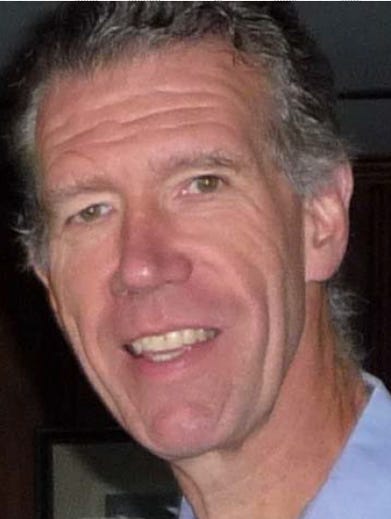"The Common Struggle" (On the Dire Mental Health Crisis in America):
It's Time for Washington DC to Act.

As we begin the New Year, how about this for a resolution: we all make a commitment to improve America’s mental health.
Meet the Press on Sunday, December 31, 2023 ran a special edition focusing on the state of this country’s mental health and mental health infrastructure. Featured guests included RI’s very own former Congressman Patrick Kennedy, and Pennsylvania Senator John Fetterman of Pennsylvania. Congressman Kennedy, in particular, offered impassioned and compelling arguments for mental health parity.
The program was hosted by Kristen Welker, who started out her career in Rhode Island as an ABC 6 reporter. Overall, the hour featured a realistic, sobering, but ultimately optimistic view of what we can do in this area.
The mental health crisis is decades in the making. Although the coronavirus greatly expanded the extent of the crisis, it did not start there. The behavioral care and substance abuse system was on the brink of disaster for a long time. The most common factors at play were lack of access and affordability.
From there, the crisis of behavioral care and substance abuse treatment infrastructure worsened, with the closure of rural hospitals, and the presence of few, if any, community health centers in some parts of the country. And let’s not forget the people who are not even diagnosed or treated properly.
Insurance companies have only compounded the problem. Many insurance companies do not cover it, which further discourages healthcare providers and institutions that would assist patients and build out such a system. Despite the passage of the Mental Health Parity & Substance Abuse Equity Act in 2008 by former Congressman Patrick Kennedy (D-RI) and the late Republican James Ramstad (R-MN), and despite its incorporation into President Obama’s Affordable Care Act (ACA), insurance lobbyists have continued to prevent such laws from being enforced. Private insurance still does not want to cover mental health and substance abuse like they would cancer or diabetes.
That has consequences across state and national boundaries. Various state governments have not invested enough in wraparound support for those with psychological disorders, addiction challenges, and other serious matters. Unfortunately, there is no better example than my home state of Rhode Island. It was once a nationally renowned leader in mental health treatment and care for those with disabilities. Yet now, the failure to combat homelessness in RI and elsewhere shows that our response to the mental health crisis must be a critical part of our response to other crises.
With the pandemic, the importance of mental health treatment has expanded considerably with more than 90% of Americans calling the rise in mental health issues a major disturbance and crisis. At least 1 in 5 Americans (not counting the undiagnosed) have been inflicted with some form of mental illness. 40% of young Americans deal with depression, loneliness, and even suicidal thoughts. The US Surgeon General himself called the situation a hidden but very serious threat to democracy itself.
Schools across the country are not equipped to deal with something of this magnitude. Yet, given the disproportionate effect rising mental illness rates are having on kids and young adults, schools will not be able to avoid it. The shortage of social workers and guidance counselors for student bodies is dire in dealing with the mass effects of social media activity, changes in technology, financial instability, and other personal crisis that are impacting our next generation.
With that in mind, a national plan still has to be developed in full. In spite of rhetoric from past administrations that did not produce much action, a tremendous amount of credit should be given to the Biden White House for advocating and taking action on the mental health crisis.
For instance, the 988 Lifeline was established in the last congressional session with President Biden’s signature and bipartisan support in Congress. And recently, the White House has taken executive action to “put teeth” (as Congressman Kennedy put it so well) in the mental parity and substance abuse laws passed in the ACA.
But there is much more Capitol Hill can do to further the work needed to take this on head-on, for the sake of the country. The White House and Congress alike can and should take the lead of the late First Lady Rosalynn Carter and former Second Lady Tipper Gore in forming a national response to the mental health crisis plaguing our next generation and entire swaths of communities today. There can be “Mental Health Moonshot,” just as there was a “Cancer Moonshot.”
It is patently clear that there are 5 issues which above all must be addressed, and quickly to reverse the troubling and worsening trends of this nation’s well-being:
Access to full insurance coverage.
Higher insurance reimbursement rates to doctors.
More psychologists and psychiatrists, with telehealth options helping to fill the access gap.
A government plan to regulate and address the negative effects of social media on mental health, as the algorithm/advertising model of social media companies allows Big Tech to make enormous profits off of damaging kids’ self-esteem and mental well-being.
Treating mental health issues like we do physical health issues is essential. Parity must be effectuated and laws on the books must be enforced with conviction and wholesale changes leveled against the insurance industry.
As we begin this New Year, the 2024 election will undoubtedly filled with vitriol and angst. Let us attempt with all our energy and conviction to be mindful of our words and actions. But more than that, let us devote ourselves to finding common ground in fighting the common struggle.





